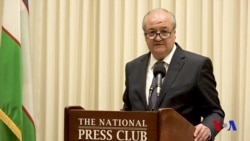Foreign Minister Abdulaziz Kamilov: Good morning, ladies and gentlemen, the representatives of mass media, experts, dear friends.
First of all, I'd like to thank you, James, Justin, and Chris for your warm introduction. And this time the delegation of Uzbekistan came to Washington to participate at the ministerial to advance religious freedom on the invitation of the Secretary of State, Michael Pompeo. Of course, we are ready to speak about reforms and many changes in Uzbekistan in its internal and external policy and how we see our foreign policy's priorities, but before that I'd like to draw your attention to the main event, to the subject of religious freedom and what is the state of the problem and what we are going to do together with the United States. I'd like to underscore some aspects of the topic of the forum with regard to Uzbekistan.
First, Uzbekistan has got a centuries' old history of tolerance and respect towards various religions and religious groups which reside in our country. Our government treats religious values with profound respect. There are 140 nationalities and 16 religious faiths in our country with operation of more than 200 religious organizations. All this stands as our greatest historical, cultural, and civilization heritage. There were never cases of international confrontation or religious conflicts in our country. We admit that sometimes the certain issues arise. However, these private cases cannot serve as a grounding for a general description of the situation in terms of religious freedom in Uzbekistan. Besides we must not also create circumstances for confrontation of various religious groups while rendering special conditions for certain of them.
Second, Uzbekistan was put in the list of countries of particular concern, CPC, and it took place in 2006. I could say that it was the worst period in the history of Uzbek-American relations. This was preceded by notorious events in Andijan in 2005, the close of the K2 military base and, in the whole, the sharp cooling in relations with Washington. This is to say the decision to enlist Uzbekistan in CPC has had a certain political background. I was an ambassador at that time to Washington, to the United States, and I remember that very difficult, very complicated period in our relations with the United States. Religious freedom issues were a part of the composition of many other serious problems and that's why it was very difficult to draw this issue from the set of other problems and to begin constructive dialogue. But why I'm speaking about it, because at present we stand at the new stage of relationship which are described by the renewed era of strategic partnership and specially after the very successful, productive, and fruitful visit of our president to the United States recently. We hope for a close cooperation on broad spectrum of issues including ensuring the religious freedom.
Third, we admit the need to adopt additional measures to implement the recommendations of the U.S. State Department in terms of improving the practice of observing religious freedoms in Uzbekistan. In this context, we have been undertaking consistent work. My colleagues maybe will tell you more on the details of such work.
And fourth, when we speak about such delicate issues as religious freedom, we must also have in mind the destructive process of politicization of religion and its exploitation by various extremist forces along achievement of their aspirations, including those in our region. Dear ladies and gentlemen, our country stands ready for a broad international cooperation in the sphere of religious freedom. In this, we see the resolute condition for successful implementation of the most important texts of the reforms carried out in the country. The main goal of these reforms is a man, his needs and interests.
Thank you for your attention, and after short statements of my colleagues, if you have some questions with respect to our foreign policy, to our priorities in our foreign policy, I'll try to answer your questions. Okay, thank you very much.






Facebook Forum